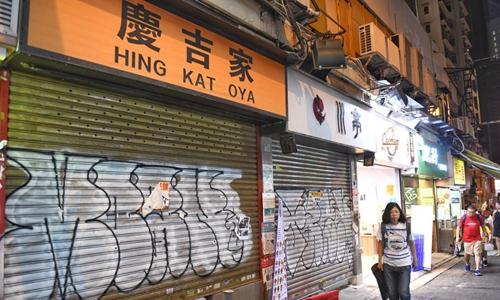HOME >> CHINA,SPECIAL-COVERAGE
HK anti-mask ruled as ‘constitutional’ reveals practical judicial thinking: experts
By Yang Sheng and Wang Wenwen Source:Global Times Published: 2020/4/10 1:16:05

Shops and restaurants are closed during chaos and unrest in south China's Hong Kong, Aug. 20, 2019.
A Hong Kong appeals court on Thursday overturned part of an earlier ruling that found the Hong Kong Special Administrative Region (HKSAR) government's ban on wearing masks at unauthorized protests "unconstitutional," declaring the measure imposed during the turmoil last year valid, with observers noting that this is a "demonstration of justice" and will help the HKSAR government quell the turmoil eventually.
In October, during the height of the anti-government turmoil, Hong Kong Chief Executive Carrie Lam invoked Emergency Regulations Ordinance (ERO) for the first time in more than 50 years that allowed the government to enact a new regulation banning face masks during unauthorized protests to stop violence and chaos. At the time, many violent and radical protesters were wearing masks to hide their identities from the police and CCTVs to avoid legal charges against their illegal activities.
However, the ban on masks was later ruled "unconstitutional" by the High Court of the HKSAR in November 2019, a decision which led to an appeal by the government in January 2020. The Court of Appeal ruled on Thursday that while "the government had the right to ban the wearing of masks at unlawful assemblies, a ban on masks at legal public gatherings was unconstitutional," Reuters reported.
Witman Hung Wai-man, a Hong Kong Deputy to the 13th National People's Congress and Principal Liaison Officer for Hong Kong, Shenzhen Qianhai Authority, told the Global Times Thursday that the decision by the appeal court is a demonstration of justice and will help the government quell the social unrest.
He noted that under the common law, any court in Hong Kong has the right to explain and judge whether the executive act of the Hong Kong government violates the Basic Law, while the National People's Congress (NPC) Standing Committee owns the ultimate explanatory right of Basic Law related issues.
The ruling of the appeal court maintains the "constitutionality" of the Emergency Regulations Ordinance and the legislation by the chief executive and based on the ruling, the chief executive can refer to the Emergency Regulations Ordinance to adopt flexible measures to cope with violent behavior in the future, said Tian Feilong, an associate professor at Beihang University in Beijing and a member of the Beijing-based Chinese Association of Hong Kong and Macao Studies, adding that this is the most sensible and progressive part of the ruling.
The appeal by the Hong Kong government and the overturning of the High Court ruling shows the rational efforts by Hong Kong's judicial procedure to maintain Basic Law order, which should be lauded, Tian said.
When the High Court ruled against the mask ban, there were calls for the NPC Standing Committee to explain the Basic Law.
"When the NPC Standing Committee explains Basic Law clauses, it exercises utmost restraint and plays an ultimate explanatory role. This time, it has also kept restraint by leaving enough judicial room for Hong Kong's courts to explain the overall constitutionality of the Emergency Regulations Ordinance and the Anti-Mask Law and the legality of specific clauses," noted Tian, adding that the appeal court ruled in accordance with this direction, therefore there is no need for explanation from the NPC Standing Committee.
In addition, the court also found that providing the police with powers to remove facial coverings was also unconstitutional. The Court of Appeal said the overall right of the government to invoke the Emergency Regulations Ordinance (ERO) was constitutional in times of "public danger."
Tian noted that the violent acts of protesters have already had the feature of terror and a "softened" Anti-Mask Law is not enough, and the chief executive and the Executive Council should prepare for more strict legislation under the Emergency Regulations Ordinance on occasions of "emergency" rather than "public danger."
Posted in: SOCIETY,LATEST NEWS